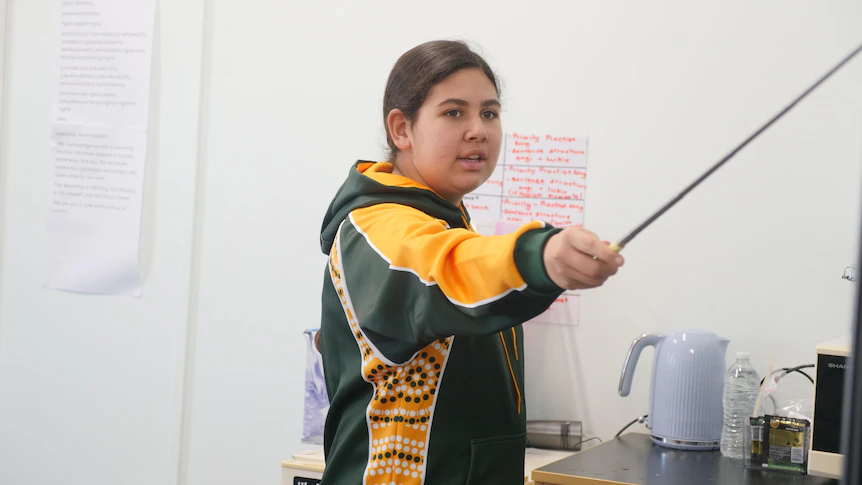By Coquohalla Connor,Sarah McConnell
Copyright abc

It’s four o’clock in the afternoon in the river town of Menindee, east of Broken Hill, and most children have finished school for the day.
But at the central school, one class is still going.
The teacher is 13-year-old Jaz Fusi; while her students are the adults who are normally her teachers.
The young Paakantyi/Ngiyampaa woman is teaching them Paakantyi, one of the traditional languages spoken by Indigenous people of the Darling River.
As the daughter of a language teacher, Jaz has been speaking Paakantyi and Ngiyampaa since she was just an infant.
So when Menindee Central School revamped how it taught languages to primary-aged children at the start of the year and its teachers also wanted to learn, the Year 8 student was offered the role.
“I was awkward at first,” Jaz admits.
For their part, the teachers-turned-students in Jaz’s class have been equally impressed, including her own English teacher, Jesse Rosenberg.
Mr Rosenberg regularly attends the Thursday session and has even found himself taking notes on her teaching style.
“I was watching this from my teaching perspective … and I was like, ‘This is amazing,’ he said.
“I learnt a lot of what I could do as a teacher from watching her.”
Jaz’s mum, Shannon Fusi, always knew her daughter would make a great language teacher and could not be prouder of her star student.
The Paakantyi/Ngiyampaa woman is both a preschool teacher and a language teacher who remembers how eager her daughter was to learn even as an infant.
“I started introducing some of the Paakantyi and Ngiyampaa words and she loved it then,” Ms Fusi said.
“It wasn’t a surprise that she wanted to take on language, I reckon she’ll take on my position.”
When kids become the teachers
The language program taught at Menindee Central School is part of the NSW government’s Language Nest initiative to revive Aboriginal languages in partnership with the Aboriginal Education Consultative Group and local communities.
With language teacher Ms Fusi, Menindee Central School principal and Paakantyi/Ngiyampaa woman Fiona Kelly began working with the nest program in January.
By term one, it was clear to both women both Indigenous and non-Indigenous children were eager to learn the local language.
“They were leaning things we didn’t think they would be learning at that stage.”
Unlike Jaz Fusi, many Indigenous people in Menindee never spoke their own language growing up, Ms Kelly said.
It has meant a lot of the teaching program being taught by Jaz and her mum has involved uncovering phrases and figuring out how to enunciate them.
“We didn’t grow up in our language because our parents and grandparents didn’t speak it,” Ms Kelly said.
Even the room where the language is taught is special to the principal.
It was once her own year one classroom. Now it’s the place where her students and teachers speak her people’s language.
Language learning building bridges
The Australian Institute of Aboriginal and Torres Strait Islander Studies’ assistant director of languages, and Iman man, Samuel Daniels, said programs like the one being run at Menindee Central School were essential to truth-telling and national identity in Australia.
“These languages are not just communication tools, they carry deep cultural knowledge and connection to Country that has been sustained for over 65,0000 years,” he said.
“Language is inseparable from identity, wellbeing and belonging … speaking language strengthens mental health, cultural pride and community cohesion.”
Mr Daniels added that opening language programs to both First Nations and non-First Nations students was also an important element, provided it was done respectfully and in partnership with local communities.
“When non-Indigenous students learn the local language, they are engaging in truth-telling, building respect and deepening the understanding of the country they live on,” he said.
Born to teach
Jaz admits that occasionally, she feels the pressure that comes from such an important role.
“Sometimes, I feel like this is a big thing, and I’m not sure if I can do it right, but then my mum will just be like, ‘You’re doing great’,” she said.
That pressure is quite obvious to her mum too.
“She gets quite emotional sometimes,” Ms Fusi said.
“She feels a lot of pressure, but she just gravitates to it [teaching].
“She is the leader in it, and that makes her quite emotional, because she was born into that.”
But, ultimately, Jaz said she was “very proud” of her language, and that it made her “feel strong”.
Speaking in Paakantyi has become so second-nature, she often talks to herself in language.
Her favourite line to say in language is about returning home — thikalaanapa — but she can also introduce herself completely in language.
“Ngayi Jaz-apa paakantyi, ngiyampa tha-tha nhuungku minintija-ntu.””Hello, I’m Jaz, a Paakantyi/Ngiyampaa young woman from Menindee.”



